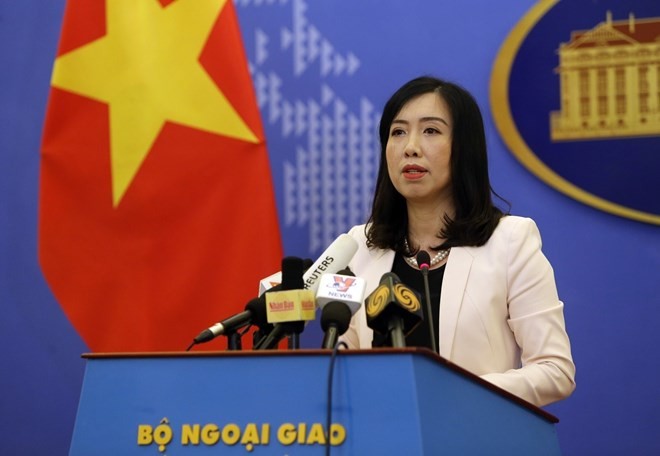
She made the statement in response to reporters’ queries about Vietnam’s comments on the recent report on the religious situation in Vietnam released by the US Commission on International Religious Freedom.
The spokesperson said the report recognised the achievements and progress in the work of ensuring and promoting religious life in Vietnam, but it still has some partial evaluations and false information about Vietnam.
“The consistent policy of the State of Vietnam is respecting and guaranteeing the right to freedom of religion and belief, and freedom of non-religion and belief of citizens. This is clearly stated in Vietnam’s constitution and law, and guaranteed and respected in reality,” she stressed.
Over the years, Vietnam has spared no effort to improve its legal system and policies in the field, especially approving the Law on Belief and Religion, as well as decrees guiding the implementation of this law, Hang said.
The practice of belief and religion is ensured with the annual organisation of thousands of religious festivals and activities, she said, adding that 95 percent of Vietnam’s population practise a belief or religion, and more than 24.3 million are followers of religions, accounting for 27 percent of the population.
The country has 53,000 religious dignitaries and 28,000 places of worship. Vietnam holds an abundance of religious events, with over 8,000 religious festivals annually. Religious organisations also actively participate in international exchange and cooperation activities, according to Hang.
She noted that Vietnam has hosted many major international religious events such as the 500th anniversary of the Protestant Reformation in 2017 and the United Nations Day of Vesak for the third time this year.
In response to questions about Vietnam’s reaction to Indonesia’s capture and destruction of Vietnamese fishing vessels, the foreign ministry spokesperson said Vietnam is deeply concerned over the issue. This action is inconsistent with bilateral relations and contrary to the UN Convention on the Law of the Sea (UNCLOS) 1982, she said.
Vietnam has worked with the Indonesian side many times and through different channels regarding this matter and asked Indonesia’s Ministry of Maritime Affairs and Fisheries and marine forces to act appropriately in line with international law, UNCLOS, and the two countries’ bilateral relations, she added.
The spokesperson said Vietnam also proposed that Indonesia treat Vietnamese fishing vessels and fishermen humanely according to the two nations’ relations and ASEAN spirit of solidarity.
Vietnam hopes to develop friendly relations and multi-faceted cooperation with Indonesia in the spirit of their strategic partnership for the benefit of both peoples, contributing to the building of a strong ASEAN Community, as well as for peace, stability, cooperation, and development in the region and the world, she emphasised.
Regarding the entry of the two US naval vessels in the 12 nautical mile area around the Ga Ven and Gac Ma reefs of Vietnam’s Truong Sa archipelago, Hang said “Vietnam has full legal foundations and historical evidence affirming its sovereignty over Hoang Sa (Paracel) and Truong Sa (Spratly) archipelagoes in accordance with international law.”
As a coastal nation in the East Sea and a member of the UNCLOS 1982, Vietnam holds that all countries are entitled to enjoy freedom of navigation and aviation, in accordance with the provisions of international law, especially the UNCLOS 1982, Hang said.
Vietnam calls on countries to continue making active and practical contributions to the maintenance of regional peace and stability, as well as respect and implement related international legal obligations and laws on seas and oceans, she added.
























